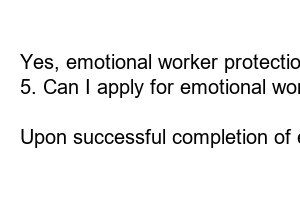감정노동자 보호교육 신청
Title: Apply for Emotional Worker Protection Training and Enhance Your Well-being!
Introduction:
Are you an emotional worker looking for ways to protect your mental well-being while helping others? Look no further! In this blog post, we will explore the benefits of emotional worker protection training and how it can empower you to navigate the challenges of your profession. Whether you’re a counselor, therapist, or social worker, this training will equip you with the necessary tools to maintain your own emotional wellness while providing support to others.
1. Understanding the Importance of Emotional Worker Protection:
As an emotional worker, it’s crucial to recognize that emotional labor can take a toll on your mental health. Emotional worker protection training offers specialized techniques and strategies to help you safeguard your well-being. From stress management to self-care practices, this training is designed to address the unique challenges faced by emotional workers.
2. Recognizing Early Warning Signs:
Through emotional worker protection training, you will learn how to identify early warning signs of burnout and compassion fatigue. These warning signs may manifest as physical, emotional, or cognitive symptoms. By recognizing these indications early on, you can take proactive measures to prevent and address burnout, allowing you to continue providing quality care to your clients.
3. Developing Effective Coping Mechanisms:
The training provides you with various coping mechanisms tailored specifically for emotional workers. You will learn techniques such as mindfulness, relaxation exercises, and boundary setting that can help alleviate stress, boost resilience, and maintain your emotional well-being. Incorporating these practices into your daily routine will ensure you are better equipped to handle the demands of your profession.
4. Building Strong Support Networks:
Emotional worker protection training emphasizes the importance of having a support network. This includes peers, mentors, and supervisors who understand the challenges you face. You will learn how to foster these relationships, seek guidance when needed, and engage in peer support to enhance your emotional well-being.
5. Implementing Boundaries and Practicing Self-Care:
Maintaining healthy boundaries and practicing self-care is essential for emotional workers to prevent emotional exhaustion. This training equips you with strategies to set clear boundaries, manage expectations, and prioritize self-care. By setting aside time for yourself, engaging in activities you enjoy, and practicing self-compassion, you can recharge and ensure you are able to provide the best care to your clients.
6. Utilizing Effective Stress Management Techniques:
Stress is a natural part of the emotional worker profession. Emotional worker protection training teaches you various stress management techniques to help you remain calm and composed in challenging situations. You will learn how to handle critical incidents, practice self-soothing techniques, and make use of resources that are available to support your well-being.
7. Applying Emotional Worker Protection Training to Your Profession:
Once you have completed emotional worker protection training, you can implement the strategies and techniques you have learned into your professional practice. This will not only benefit you personally but also enhance the quality of care you provide to your clients.
Summary:
Emotional worker protection training is a vital resource for those in the helping professions. By understanding the importance of emotional well-being, recognizing warning signs, implementing coping mechanisms, building support networks, setting boundaries, practicing self-care, and utilizing stress management techniques, emotional workers can protect themselves while continuing to support others. Invest in your well-being today and apply for emotional worker protection training to empower yourself in your noble profession.
FAQs:
1. Who can benefit from emotional worker protection training?
Emotional worker protection training is beneficial for counselors, therapists, social workers, and any professionals working in emotionally demanding professions.
2. How long does the training typically take?
The duration of emotional worker protection training varies depending on the program, but it usually ranges from a few days to a few weeks.
3. Can I still apply if I am not experiencing burnout?
Absolutely! Emotional worker protection training is designed to be proactive, helping you prevent and mitigate burnout before it becomes overwhelming.
4. Will the training help me become more effective in my profession?
Yes, emotional worker protection training equips you with valuable strategies and techniques that enhance your overall effectiveness in providing care to clients.
5. Can I apply for emotional worker protection training online?
Yes, many organizations offer online training programs that allow you to participate from the comfort of your own home or office.
6. Will I receive a certification upon completing the training?
Upon successful completion of emotional worker protection training, you will typically receive a certification that acknowledges your commitment to maintaining emotional well-being in your profession.

